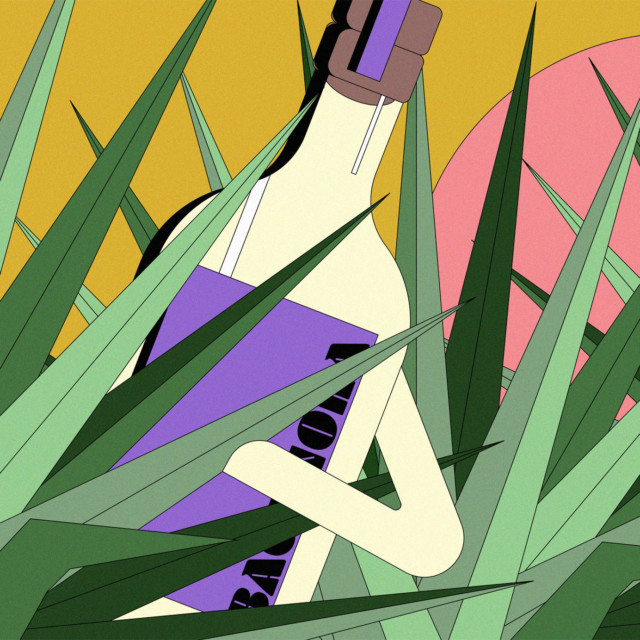There is one rebel that stands out in every family, and for agave, that rebel is bacanora. Sliding silkily down the throat with a savory, whiskey-like smokiness that lingers on the palate, it’s been casting its charm on the people of Sonora for hundreds of years, but is a mere whisper in America against its behemoth cousins, tequila and mezcal. Outlawed in Mexico until 1992, bacanora has been compared to an American moonshine, and it’s worthy of any serious agave spirit drinker’s attention.
To be a rebel, one must have a complicated story. Derived from the Agave Pacifica plant, bacanora is named after the small town of Bacanora. There, locals enjoyed the spirit (a subtype of mezcal that has been produced in Sonora for over 300 years) on a regular basis until the conservative Governor of Sonora, believing it caused immoral behavior among citizens, decided to ban the beverage. Distillers were driven underground, continuing to create bacanora in secret under the threat of imprisonment or death by hanging if caught. “One of the reasons we use the tagline ‘the Original Outlaw Spirit’ is because, despite the stiff penalty, these intrepid people continued to make bacanora with hidden stills,” says Ruben Lopez, founder of Sunora Bacanora.
In 1992, the Mexican government finally repealed the ban and in 2000, bacanora was officially granted a Denomination of Origin (NOM) that declared the spirit could only be made within a set of 35 Sonoran municipalities. Still, production couldn’t exactly kick into high gear overnight. It takes approximately seven years for the Agave Pacifica to reach the maturity needed for production, so it took the newly legal liquor a few years to get back on its feet, and even then, it had little name recognition across the border to drive interest or sales.
Mel and Connie Abert, who import bacanoras for Novel Spirits Collection, recall when their son discovered a bottle in 2012 on a dusty liquor store shelf in Los Cabos. “He was so impressed that he immediately wanted to start importing it and asked the Mexican governing body for bacanora to meet some distillers,” the Aberts explain. The family eventually met with 14 distillers and settled on working with the Pascola and 314 Huellas brands. “These were family recipes and they had preserved the tradition of bacanora,” says Connie.
While the smoothness of bacanora makes it easy to drink straight, its versatility can be used to craft unique cocktails. The award-winning restaurant Bacanora in Phoenix offers a few on its menu, mixing bacanora with tequila for a Bacanorita and combining it with sherry and rum for Cocktail Numero Dos. Plus, of course, there’s a bacanora butterscotch that is integral to their locally collaborative cocktail, Chicken Milk.
With the ban keeping distilling underground for decades, bacanora production has remained mostly unchanged for many producers. The process can be old-school and intense; for instance, Sunora Bacanora relies on manual methods to remove leaves and split piñas (done by jimadores, skilled agave farmers) before roasting them in the underground mallas. While some distillers use mechanical crushers to separate the fibers and juices, Sunora still uses tahonas, circular stone-grinding wheels.
Luckily, the dedication is paying off, and 20 years after the ban on bacanora was repealed, the smoky spirit is finally starting to gain traction. In 2020, Sonoran law eased the licensing requirements for local stores to sell bacanora, giving a boost to smaller producers; later that year, the European Union officially recognized bacanora as a unique regional product and gave it a protected Denomination of Origin status, helping provide credibility and increased potential for sales in Europe. “We are a blip in the market compared to tequila,” Lopez notes, “but tequila has also had a 50 year head start on us.”
As bacanora’s popularity creeps upward, the number of producers has grown, triggering some tension between traditional producers and commercialized ones. There’s also the added weight of ecology and sustainability; for a spirit made with wild agave for hundreds of years, agave farms are now necessary to keep up with demand and time needed for those plants to mature. “It’s really slow, but bacanora is starting to take hold and mezcal bars are really interested in it,” the Aberts say.
While it may not yet be readily available on every liquor store shelf, drinkers can source bacanora throughout the United States. Brands like Sunora, Puntagave, and Rancho Tepua can be bought at some Total Wine stores, while Pascola and 314 Huellas are found online or in some independent liquor stores. “It’s all about education,” the Aberts say. “We are doing this with a lot of hard work and love for these products. We both believe that this is going to be the next mezcal.” Although it may take some effort to get your hands on a bottle, bacanora is worth seeking — especially before the “secret of Sonora” gets out.
